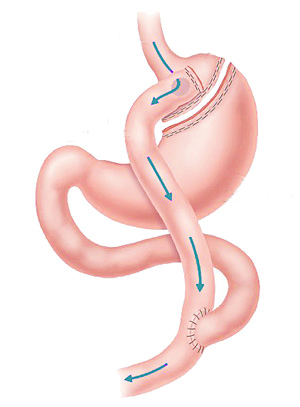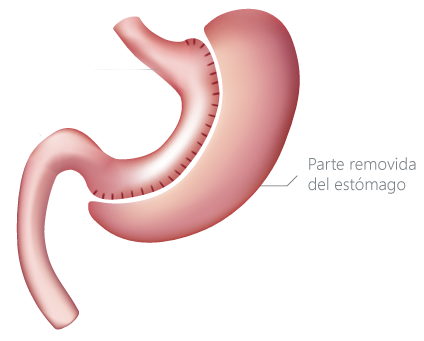At Cànons Clinics we help our patients achieve lasting weight loss through the best Bariatric Surgery procedures available today. Our highly qualified and experienced surgeons analyze each patient in a personalized way, to determine the type of surgery that achieves the greatest impact in the shortest possible time.
We incorporate the latest technologies with the aim of offering the best results with total precision and maximum safety and comfort throughout the process. Our clinic staff will guide you through every step from your first consultation to the surprising results.

Incorporamos tecnologías de última generación con el objetivo de ofrecer los mejores resultados con total precisión y la máxima seguridad y comodidad durante todo el proceso. El personal de nuestra clínica te guiará en cada paso desde tu primera consulta hasta los sorprendentes resultados.

The Gastric Bypass allows food to pass through the digestive system faster. This technique consists of reducing the size of the stomach and connecting it to the section of intestine that has less capacity to absorb food, bypassing the part with the highest absorption capacity. Therefore it is a mixed technique (restrictive and bad absorptive), the reduced capacity of the stomach restricts the amount of food that can be consumed and the bypass reduces the calories absorbed. In this way, the body does not receive as much energy and loses weight.
Who is the ideal candidate to undergo a Gastric Bypass?
It is normally performed on people with a Body Mass Index (BMI) greater than 40 Kg / m2. Also in people with a lower BMI but with some disease related to obesity.
How much weight am I going to lose?
Most patients enjoy a weight loss of between 4 and 8 kilos per month during the first year. On average, an excess weight loss of 60% and 70% is maintained after 10 years.
What are the benefits?
• Significant long-term weight loss.
• Restriction of food intake.
• Reduction of Ghrelin (“the hunger hormone”).
• Remission of diabetes, high blood pressure and other diseases associated with obesity.
What drawbacks does it entail?
• otential long-term vitamin and mineral deficiency.
• Requires strict adherence to dietary recommendations and lifetime vitamin and mineral supplementation.
• Strict periodic reviews.
Why a Gastric Bypass?
• It is the surgical technique for weight loss considered the “gold standard” due to its effectiveness, proven in numerous studies of high scientific rigor.
• Produces significant short-term weight loss that is sustained over the long term.
• The redirection of the digestive system produces changes in the intestinal hormones, promoting early satiety, suppressing hunger and reversing the main mechanisms by which morbid obesity induces Type 2 Diabetes.
• It presents the best results in terms of resolution of diseases derived from obesity.

The Gastric Sleeve, also known as Vertical Gastrectomy, consists of reducing the size of the stomach by approximately 75%, resulting in a stomach with a decreased capacity to store food by up to 25%. In this way a faster and more lasting feeling of satiety is experienced, allowing you to eat less frequently and in less quantity. Fundamentally it causes a restriction of the ingestion. In this technique, the intestines remain intact, which reduces the risk of complications. In addition, the stomach maintains its function.
Who is the ideal candidate to undergo a Gastric Sleeve?
It is a tested and recommended technique in patients with a BMI greater than 35 Kg / m2 and who have experienced diet plans and exercise with little or no success.
How much weight am I going to lose?
Usually there is a weight loss of 50% at 6 months. It is up to each patient to modify their eating habits and thus maintain this weight loss.
What are the benefits?
• Quick feeling of satiety.
• Lower risk of complications.
• Reduction of Ghrelin (“the hunger hormone”).
• Remission of diabetes, high blood pressure and other diseases associated with obesity.
What drawbacks does it entail?
• Possibility of inadequate weight loss.
• The procedure is irreversible.
• Change in eating habits to five small meals a day instead of three.
Why a Gastric Sleeve?
• More chances of success and more lasting, compared to intragastric balloon and gastric band surgery.
• You will lose most of the weight during the first 18 months.
• This surgery is usually the first of two procedures. It is used to facilitate initial weight loss in highly obese patients, and then perform more complex procedures such as Gastric Bypass with less risk of complications.

A Weight Loss Revision Surgery may include converting one technique to another, making a correction or alteration to a previous surgery, or even reversing a procedure entirely. At Cànons Clinics we analyze your case in a personalized way based on multiple factors and we recommend the type of surgery that best suits you.
Who is the ideal candidate to undergo Revision Surgery?
All those people who are not completely satisfied with their bariatric surgery for various reasons, such as insufficient weight loss, a technical complication or, conversely, excessive weight loss.
What are the benefits?
• Boosts body weight loss results.
• Correction of technical complications, resulting in greater comfort for the patient.
• Completely reverse certain procedures.
What drawbacks does it entail?
• The procedures can be technically challenging due to complications and scar tissue from previous surgeries.
• Increased risk of complications.
• Not all surgeons are capable of performing these procedures.
